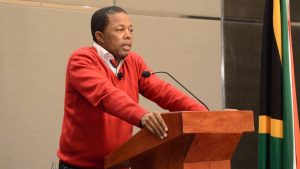
Chairperson of the African Editors Forum Jovial Rantao
The African Editors Forum joins fellow Africans in expressing deep concern at the devastating impact that the deadly Coronavirus (Covid-19) has had on lives and economies across the continent, leading to the temporary closure of some media houses.
Coronavirus continues to infect millions across the world and kill thousands. The crisis demands more and not fewer media outlets – both print and digital – to inform, educate and provide news about one of the biggest pandemics in our lifetime.
In Tunisia, the Tunisian Federation of Newspaper Directors took the painful decision to stop the printing of distribution of 7 daily and 20 weekly newspapers in an effort to minimise the spread of Coronavirus.
In Morocco and Algeria, calls have been for newspaper printing and distribution to be stopped during the lockdown ordered by the governments in both countries. TAEF expects this trend to grow as African countries implement drastic measures to contain and stop the spread of Coronavirus.
While the Tunisian publishers’ decision, taken in the interest of the public, is laudable, its negative effects are that there will be fewer voices in the media in Tunisia and there will be job losses, some of them temporary.
TAEF also acknowledges that many other media outlets in countries across Africa will experience hardships as a result of economies battered by the onset of Coronavirus, We express solidarity with them.
Times of a crisis of the scale of the Coronavirus requires bold and visionary leadership to save lives, economies and jobs. In this regard, TAEF calls on governments and big business, including media houses, to work together and find solutions to retain the plurality of voices in the media across Africa.
This includes, but not limited to, publishing digital editions of the publications and ensuring that the poorest of the poor across the continent have access to this through better data connections and pricing.
TAEF also commends some governments and major technology companies on the continent who have taken tough measures to stop the spread of fake news on Coronavirus.
TAEF reiterates its solidarity with the thousands of journalists, editors and media workers across the African continent who continue to work under difficult conditions to bring communities and nations news and information about Coronavirus. At least three journalists have been infected and battling to survive the deadly virus.
Throughout the ages, journalists have braved atrocious conditions to bring news stories, photographs and video footage about wars and other pandemics, such as Ebola, that have afflicted the nations across Africa.
Covering COVID-19, one of the biggest pandemics to hit mankind in recent history, is a call of duty that journalists, editors and media workers have carried out with great aplomb. This goes from providing communities across the continent with basic information about how they can prevent the spread of the virus and what to do if they think they have it.
The media has also played a crucial role in providing news and information that people can use as country after country enforces lockdowns in a desperate effort to stop the spread of the COVID-19, which has decimated lives across Europe at an alarming rate.
In addition to expressing its support to the media across Africa, TAEF calls on governments who have not yet declared media workers as essential workers to do so. This would, as it has done before, enable them to do their work without any hindrance. TAEF also cautions that the onset of the COVID-19 pandemic must not be used by some governments on our continent to restrict media freedom and independence.









Comments